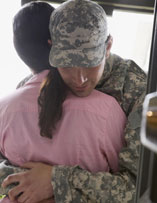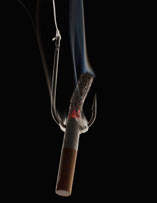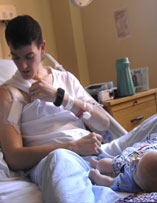Assessments
Overview
This section provides links to descriptions, scoring information, and supporting research for each of AfterDeployment.T2.Health.mil's twenty-nine self-assessments.

Alcohol and Drugs
The Alcohol, Smoking and Substance Involvement Screening Test (ASSIST) was developed for the World Health Organization (WHO) by an international group of substance abuse researchers to detect and manage substance use and related problems in primary and general medical care settings.
Click here to see assessment details.

Anger
The DAR was shown to be a reliable, sensitive measure of anger in Vietnam veterans with combat-related PTSD. It was also reported to be sensitive to therapeutic change associated with PTSD intervention. As such, it shows potential utility as a diagnostic and treatment outcome tool.
Click here to see assessment details.

Anxiety
The GAD-7 is a subset of the full PHQ. It has been shown to identify generalized anxiety disorder.
Click here to see assessment details.

Caregiver Stress
Developed by the American Medical Association, the Caregiver Self-Assessment Questionnaire uses 18 items to identify an at-risk population of individuals who are feeling overwhelmed by caretaking demands.
Click here to see assessment details.

Depression
The scale is the 9-item subset of the Patient Health Questionnaire asking about symptoms of major depression. Developed by Pfizer, Inc.
Click here to see assessment details.

Forgiveness
An 18-item scale that measures an individual's dispositional forgiveness, i.e., the general tendency to forgive others, self, and situations over which the individual had no control (e.g. illness).
Click here to see assessment details.

Generosity
The IGS is a 10-item scale developed at Notre Dame University. It is designed to measure the degree to which individuals spend themselves (i.e., their attention, time, emotion, energy, etc.) to enhance the well-being of others in interpersonal relationships.
Click here to see assessment details.

Gratitude
The Gratitude Questionnaire-Six-Item Form (GQ-6) is a six-item self-report questionnaire designed to assess individual differences in the proneness to experience gratitude in daily life.
Click here to see assessment details.

Hope
The adult hope scale (AHS) measures hope, defined as "a positive motivational state that is based on an interactively derived sense of successful (a) agency (goal-directed energy), and (b) pathways (planning to meet goals)". The adult hope scale contains 8 items.
Click here to see assessment details.

Satisfaction with Life
The Satisfaction with Life Scale is a 5-item scale that measures general satisfaction with life.
Click here to see assessment details.

Marital Satisfaction
The Locke Wallace Marital Adjustment Test is a 15-item scale that assesses marital satisfaction.
Click here to see assessment details.

Military Sexual Trauma
The PCL is a standardized self-report rating scale for PTSD comprising 17 items that correspond to the key symptoms of PTSD. Two versions of the PCL exist: 1) PCL-M is specific to PTSD caused by military experiences and 2) PCL-C/S is applied generally to any traumatic event/specifically indentified event.
Click here to see assessment details.

mild Traumatic Brain Injury
The Self-Efficacy for Symptom Management Scale, a 13-item scale to assess the ability of patients to manage common challenges associated with TBI.
Click here to see assessment details.

Nicotine Dependence
A 6-item scale designed to assess the degree to which an individual relies on smoked tobacco to maintain a sense of well-being.
Click here to see assessment details.

Optimism
The Life Orientation Test (LOT) is a 10-item scale that was developed to assess individual differences in generalized optimism versus pessimism. This measure has been used in a good deal of research on the behavioral, affective, and health consequences of the Optimism/Pessimism dimension.
Click here to see assessment details.

Panic
The PHQ Panic is a subset of the full PHQ. It has been shown to identify panic disorder better than other anxiety disorders.
Click here to see assessment details.

Parenting Confidence
The Parenting Sense of Competence Scale is a 16-item scale that measures parents' sense of confidence and satisfaction with their parenting.
Click here to see assessment details.

Perceived Social Support
A 12-item scale of perceived social support from family and friends. Does not refer to deployment.
Click here to see assessment details.

Physical Injury Resilience
The RSES is a 22-item scale emphasizing coping processes. it was developed by the NC-PTSD and was validated using active duty and reserve component military samples (N = 1059). Used here with a slight modification to instructions.
Click here to see assessment details.

Post Deployment Social Support
The Post-Deployment Social Support Scale is a subscale of the full DRRI containing 15-items measuring the degree to which respondent felt support from family and friends upon returning from deployment.
Click here to see assessment details.

Post-Traumatic Stress
The PCL is a standardized self-report rating scale for PTSD comprising 17 items that correspond to the key symptoms of PTSD. Two versions of the PCL exist: 1) PCL-M is specific to PTSD caused by military experiences and 2) PCL-C/S is applied generally to any traumatic events/specifically identified event.
Click here to see assessment details.

Friendship Scale
The Friendship Scale is a short, six-item scale assessing social isolation.
Click here to see assessment details.

Resilience
The RSES is a 22-item scale emphasizing coping processes. It was developed by the NC-PTSD and was validated using active duty and reserve component military samples (N = 1059).
Click here to see assessment details.

Life Stress
The Perceived Stress Scale (PSS) is the most widely used psychological instrument for measuring the perception of stress. It is a measure of the degree to which situations in one's life are appraised as stressful. Items were designed to tap how unpredictable, uncontrollable, and overloaded respondents find their lives.
Click here to see assessment details.

Sleep
A 10-item T-F scale developed by the American Academy of Sleep Medicine to evaluate the presence of common sleep difficulties and daytime tiredness.
Click here to see assessment details.

Spirituality
The Brief RCOPE consists of 14 items comprising two subscales that measure two patterns of religious coping methods, positive and negative coping. Spiritual Struggle is defined as "efforts to conserve or transform a spirituality that has been threatened or harmed".
Click here to see assessment details.

Stigma
The SSOSH is a 10-item scale that measures a respondent's level of comfort or concern with regard to seeking psychological help from a therapist.
Click here to see assessment details.

Work Adjustment
A 10-item general self-efficacy scale where respondents are asked to report how confident they are in their ability to manage challenges associated with the work environment.
Click here to see assessment details.

Worry
The Penn State Worry Questionnaire is a 16-item scale developed in 1990.
Click here to see assessment details.
- 22794 reads

















